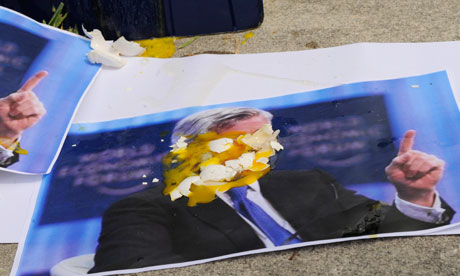The public apology has long been a staple of PR and reputation management, and this year saw a large number of C-level mea culpas. Some were mandated, while others were designed to beg forgiveness, right wrongs, or restore good will. Here’s my list of the most notable.
Picture this: Instagram is forced to backpedal after issuing a modified Terms of Service policy that many feared could “effectively transform the Web site into the world’s largest stock photo agency.” In a blog post, cofounder Kevin Systrom blamed “confusing language” and pledged not to sell users’ photos. His statement did quell one controversy, but the social media storm has raised other issues about privacy and user protections.
Pink slip-up? The saddest, and possibly most ineffectual, apology might have been that delivered by former Yahoo CEO Scott Thompson about his “resume inflation.” The embattled chief issued a statement taking responsibility for the goof and apologizing to Yahoo employees, but without any explanation or clear way forward. It wasn’t enough; he was ousted after just four months on the job.
J.P. Morgan Chase CEO Jamie Dimon‘s apology for unprecedented trading losses was surprisingly robust for the previously untouchable banker; in “contrite” and widely publicized testimony before the Senate Banking Committee, he called the bank’s $2 billion error “embarrassing,” adding “the buck stops with me.” Dimon’s statement got mixed reviews, primarily due to his opposition to regulatory measures that many feel might have kept the bucks in the bank. The apology was articulate, yet Dimon’s credibility took a hit.
Among the most delayed and ultimately impotent apologies was that offered by Nancy Brinker, Founder and CEO of Susan G. Komen for the Cure. Brinker’s explanation of Komen’s initial decision to withhold funding from Planned Parenthood, in which she admitted that she “made some mistakes” in letting things be politicized, wasn’t enough to pacify critics, and the group’s fundraising continues to be less than healthy.
The most shocking public admission of culpability might have been delivered by Irene Dorner, president and CEO of HSBC Bank USA. Dorner testified about the lack of controls that allowed Mexican drug cartels and other illicit organizations to launder billions through HSBC’s U.S. operation. Though the misconduct predated her tenure, Dormer expressed “deep regret” for the lapses and pledged that the bank had “burned bridges” so that it could not happen again. But many were skeptical of a whitewash, given the bank’s relatively light fine, and no criminal prosecutions.
Talk about bad taste. One of the lamer apologies came from Popchips CEO Keith Belling after a video ad threatened to fry the brand’s reputation. In it, Ashton Kutcher impersonated different characters in what resembled a video dating parody. One persona was “Raj,” a Bollywood producer complete with brownface and a phony singsong meant to be an Indian accent. Many viewers thought it racist, prompting Belling to respond, “Our team worked hard to create a light-hearted parody featuring a variety of characters that was meant to provide a few laughs…. I take full responsibility and apologize to anyone we offended.” In my book, anyone who utters such a mealy-mouthed sound bite should eat his words; a half-baked apology usually makes things worse. Yet, Popchips took down the video and the food fight calmed down.
By most accounts, the Apple CEO Tim Cook’s mea culpa following its Maps debacle hit all the right notes. The full letter to customers is a masterpiece of good communications. It was swift and direct, and in the statement Cook took responsibility for the lapse and pledged to fix it. He won extra credibility by recommending that users download competitive products until such time as Apple could get it right. The apology succeeded because it reminded us how rare it is for Apple to disappoint its customers.

